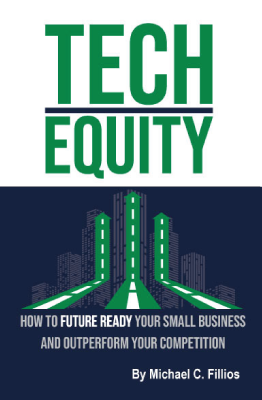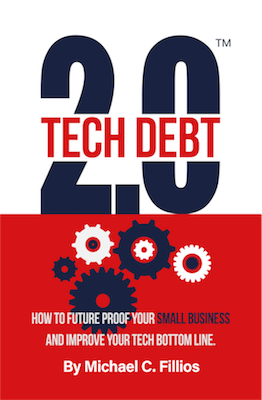BOOKS
TECH EQUITY
In a timely follow up to the concepts and strategies revealed in his first book, Tech Debt 2.0, Michael C. Fillios delivers his next installment of expert, tech-savvy business guidance, with Tech Equity. Writing from the perspective of small and medium-sized businesses (SMBs), and with the devastating effects of the global pandemic in mind, Fillios explains why now, more than ever, it is critical to shift from the defensive maintenance of technical debt, go on offense, and lead the charge toward building Tech Equity.
Conceptually viewed as an asset, Tech Equity comprises key components of a company’s technology portfolio. SMBs that invest in building Tech Equity are better positioned to navigate crises, take advantage of opportunities, and outperform the competition. This not only translates to higher returns and a more appealing balance sheet, but yields greater talent retention, a heightened focus on the customer experience, and a better understanding of the company itself.
Tech Equity, How to Future Ready Your Small Business and Outperform Your Competition, guides SMBs through the complexities of Tech Equity by delving into the topics of data and analytics, customer focus, digital culture, security, and more. Fillios draws on more than 25 years of experience in business, finance, and IT leadership and includes multiple real-world case studies demonstrating Tech Equity in action, amidst the challenges of the pandemic, as companies compete for survival and search for new opportunities. Complete with strategies and tools for building, diagnosing, and measuring Tech Equity, business leaders will find Michael Fillios’ latest publication an invaluable resource for understanding the importance of Tech Equity and its crucial role as they future ready their business.
TECH DEBT 2.0™
In a direct response to the rapidly evolving digital landscape, Michael C. Fillios presents his groundbreaking insights in Tech Debt 2.0™. Focusing on the unique challenges faced by small and medium-sized businesses (SMBs), Fillios sheds light on the modern implications of technical debt, emphasizing its potential existential threat to these enterprises. In today’s digital age, where technology is integral to business operations, understanding and managing tech debt has become paramount.
Tech Debt 2.0™ is not just about software bugs or legacy code; it’s an expanded concept that encompasses the broader implications of technology on businesses. It signifies the liabilities SMBs might incur from the development, acquisition, use, and retirement of technology. When not managed effectively, this debt can jeopardize the very survival of a business. However, when approached strategically, tech debt can be leveraged to gain a competitive edge, especially when it’s incurred intentionally with clear business objectives in mind.
Tech Debt 2.0™: How to Future Proof Your Small Business and Improve Your Tech Bottom Line navigates SMBs through the intricate maze of modern tech debt. Drawing from his vast experience spanning over two decades in business, finance, and IT, Fillios offers invaluable strategies to help businesses manage evolving technology to their advantage. The book is enriched with real-world case studies and introduces tools like the Tech Debt 2.0 diagnostic, aiding businesses in understanding and measuring their tech debt. For business leaders striving to stay ahead in the digital race, Tech Debt 2.0™ serves as an essential guide, emphasizing the significance of tech debt and its role in shaping the future trajectory of their enterprises.
“Tech Equity by Michael C. Fillios counts the fringe benefits that SMBs can reap from using the contemporary technologies. It is appreciable that the author adds a recap point at the end of each chapter to make sure that you understood the most important concepts that you will need to apply.”
“Fillios seamlessly takes the reader from A to Z… expertly presented, concise, and fluid.”
“Fillios is about approaching the concept of tech equity from the standpoint of it being beneficial for all involved and not just on a semantic scale.”
“Amazing read from Michael C. Fillios about how SMBs can leverage technology to create “tech equity”!
Restaurants, medical practices, wholesale businesses, fitness companies, and many other SMBs were all hit hard by the pandemic. However, the ones that were able to navigate through the crisis best were those with the strongest and widest #TechEquity.
More importantly, leveraging Tech Equity as a breeding ground for opportunities can also sometimes help SMBs thrive and outperform the competition, as business valuation increases.
Such a strategy includes:
– Right planning and understanding of the current company’s state
– Appropriate investment
– Disciplined technology portfolio management strategy
– Agile decision-making
– Right balance between creating value and mitigating risks”
Amazon Customer
“Excellent follow up to Tech Debt 2.0.”
“There is no wasted motion in this book. He exhibits enough personality during these pages to undercut the inherent dryness of the material. Michael Fillios has written an invaluable reference book for SMB leadership and there’s enough of a cautionary edge within these pages to give the text an instructive quality.”
“Fillios deserves considerable plaudits for condensing important and often comprehensible issues into a format that glosses over nothing and touches on every aspect of the tech debt concept, how it affects small and medium sized businesses, and how such companies can address those problems.”
“Tech Debt 2.0: How to Future Proof Your Small Business and Improve Your Bottom Line is an invaluable addition to literature of this type and should likely prove to be an ongoing resource for those value this sort of material. It’s safe to assume, as well, that it won’t lose its relevancy any time soon.”
“I find the tone compelling. It isn’t as if Fillios is remaking the writing wheel with this book, but he never adopts the stentorian diction you might expect from such a person. This is a writer who doesn’t want to “talk down” to the reader but speaks to them from a position of respect and with a genuine desire to help.”


